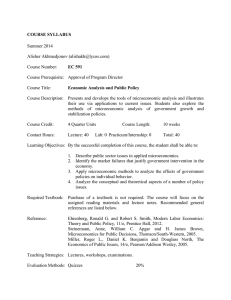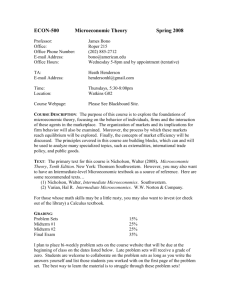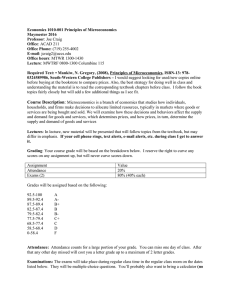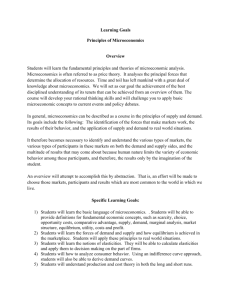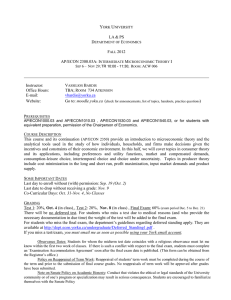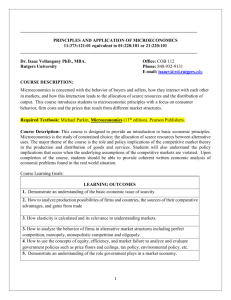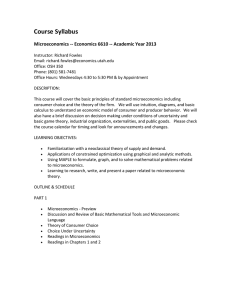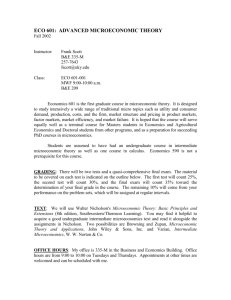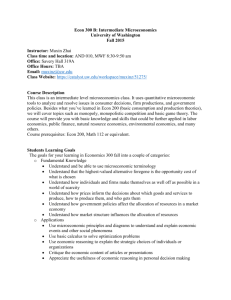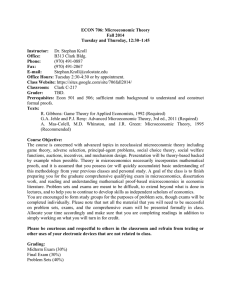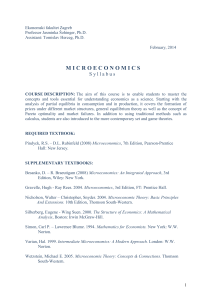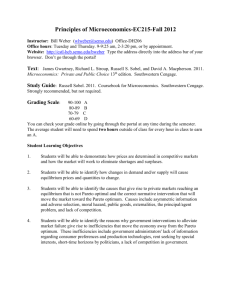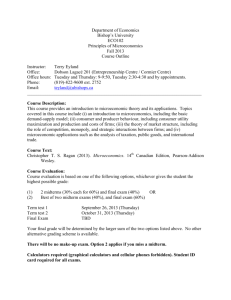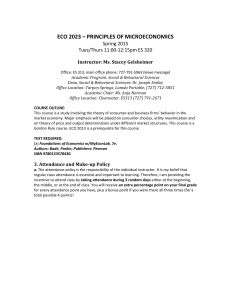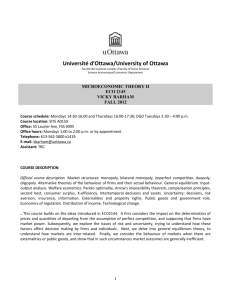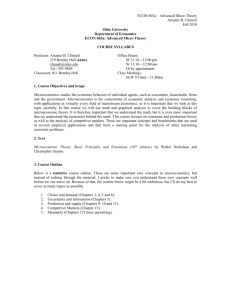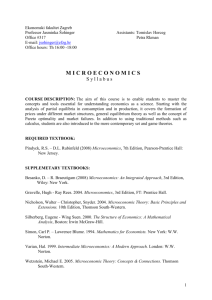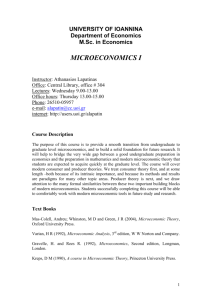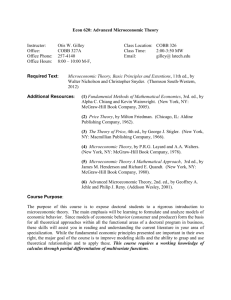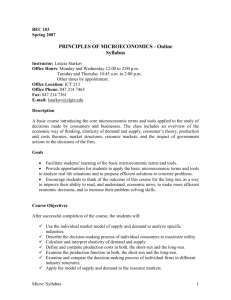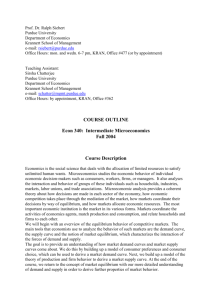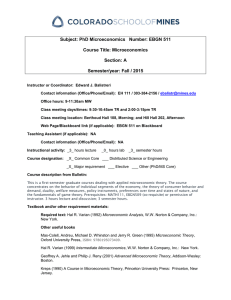EC201.04 - Boston College
advertisement
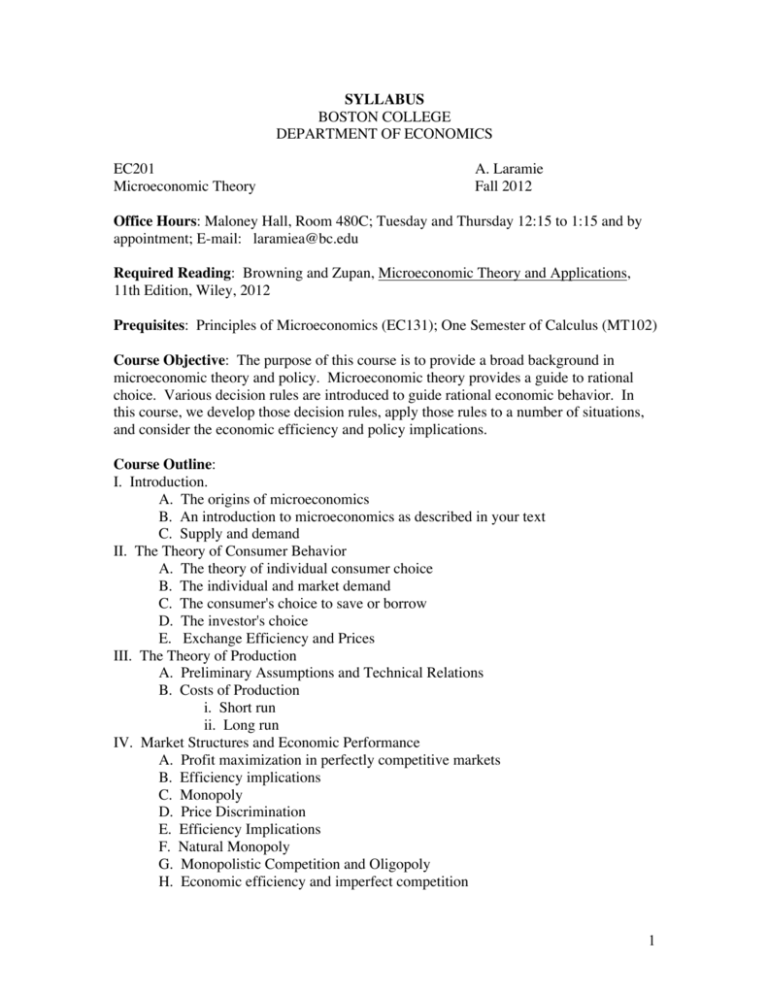
SYLLABUS BOSTON COLLEGE DEPARTMENT OF ECONOMICS EC201 Microeconomic Theory A. Laramie Fall 2012 Office Hours: Maloney Hall, Room 480C; Tuesday and Thursday 12:15 to 1:15 and by appointment; E-mail: laramiea@bc.edu Required Reading: Browning and Zupan, Microeconomic Theory and Applications, 11th Edition, Wiley, 2012 Prequisites: Principles of Microeconomics (EC131); One Semester of Calculus (MT102) Course Objective: The purpose of this course is to provide a broad background in microeconomic theory and policy. Microeconomic theory provides a guide to rational choice. Various decision rules are introduced to guide rational economic behavior. In this course, we develop those decision rules, apply those rules to a number of situations, and consider the economic efficiency and policy implications. Course Outline: I. Introduction. A. The origins of microeconomics B. An introduction to microeconomics as described in your text C. Supply and demand II. The Theory of Consumer Behavior A. The theory of individual consumer choice B. The individual and market demand C. The consumer's choice to save or borrow D. The investor's choice E. Exchange Efficiency and Prices III. The Theory of Production A. Preliminary Assumptions and Technical Relations B. Costs of Production i. Short run ii. Long run IV. Market Structures and Economic Performance A. Profit maximization in perfectly competitive markets B. Efficiency implications C. Monopoly D. Price Discrimination E. Efficiency Implications F. Natural Monopoly G. Monopolistic Competition and Oligopoly H. Economic efficiency and imperfect competition 1 Homework: In addition to the assigned readings, end-of-chapter exercises have been assigned. You are to complete these exercises as tentatively scheduled below. The exercises will be collected and graded on a 0 to 10 scale (with ten being the maximum number of points). Homework emailed to me will not be accepted. The grade on homework submitted late will be reduced by one point for every class day (defined as Monday through Friday) that it is late. Attendance: Attendance will be taken at the beginning of every class. Regular attendance is expected. Classroom Etiquette: Students need to arrive to class on time, and remain seated during the class period. In case a student needs to leave the classroom during the class period, the student is allowed to leave, but the student will not be readmitted until the class period is over. The use of electronic devices, such as cell phones, is prohibited during class time. The use of computers is prohibited during class time, unless the appropriate college officer recommends computer use, as a means to take notes, as a reasonable American Disabilities Act learning accommodation. Handheld calculators are allowed in the classroom. Cell phone calculators are not allowed in the classroom. Failure to adhere to these standards can result, at my discretion, in a reduction in the final course grade. Academic Integrity: "Academic integrity is central to the mission of higher education. Please observe the highest standards of academic integrity in this course. Please review the standards and procedures that are published in the university catalog. Make sure that the work you submit is in accordance with university policies. If you have any questions, please consult with me. Violations will be reported to the Deans' Office and reviewed by the College's Committee on Academic Integrity. Violations could result in failure in the course or even more severe sanctions." (letter from Joseph Quinn) Grading: Grading is based upon two semester exams, graded homework assignments, and a final exam. Each semester exam's grade weight is 25%. The homework’s grade weight is 10%. The final exam's grade weight is 40%. The final exam will be cumulative. TENTATIVE ASSIGNMENT SCHEDULE: Week of: 9/4 Introduction Chapters 1 9/11 Chapter 1 continued, Questions 1.6, 1.8 Chapter 2 9/18 Chapter 2 continued, Questions 2.4, 2.7, 2.9, 2.12, 2.15, 9/25 Chapter 3, Questions 3.1, 3.5, 3.8, 3.14, 3.16, 3.19 10/2 Chapter 4. Questions 4.1 - 4.3, 4.7, 4.20 Exam 1 (Chapters 1 -4) 10/9 Chapter 5, sections 5.5 and 5.6, Questions 5.10, 5.12, 5.18 10/16 Chapter 6, Questions 6.1, 6.2, 6.4, 6.8, 6.13 2 10/23 10/30 11/6 11/13 11/20 11/27 12/4 Chapter 7, Questions 7.1, 7.2, 7.7, 7.12, 7.16, 7.17 Chapter 8 Chapter 8 continued, Questions 8.1, 8.3, 8.8, 8.10, 8.19 EXAM 2, (Chapters 5 -8) Chapter 9 Chapter 9, continued, Questions 9.1, 9.2, 9.6, 9.11, 9.12, 9.14, 9.16, 9.18, 9.22 Chapter 10, sections 10.1, 10.2 Chapter 10 continued, questions 10.1, 10.2 Chapter 11, Questions 11.1, 11.5, 11.7, 11.14, 11.15, 11.17 Chapter 12, sections 12.1 - 12.3 Chapter 13 Final exam: 12/17@12:30PM 3
